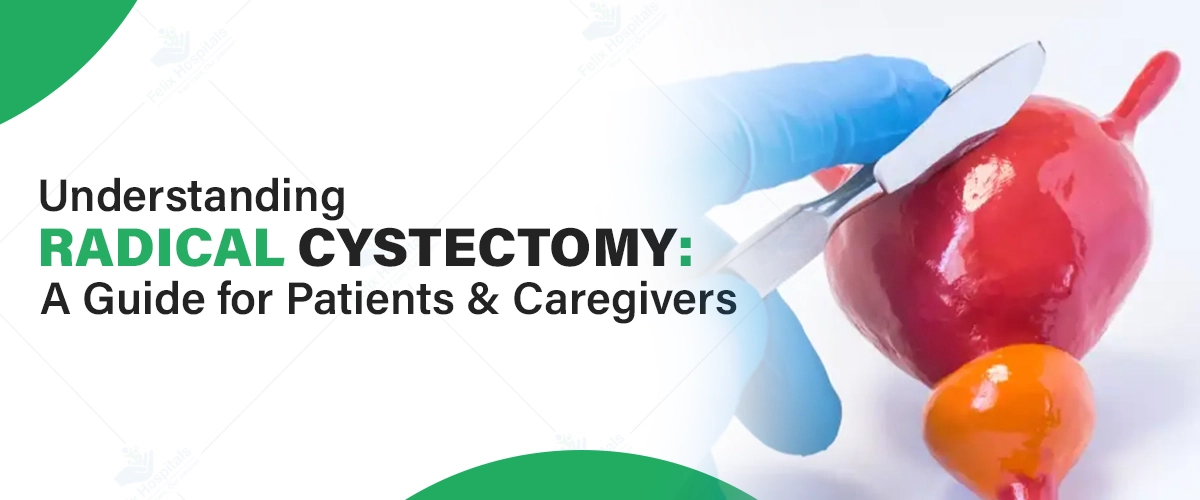
Subscribe to our

Radical cystectomy, a surgical procedure to remove the bladder, is a crucial treatment option for patients diagnosed with invasive bladder cancer or other severe bladder conditions. This procedure is most commonly performed to treat advanced bladder cancer, often when other treatments are not effective. If you are searching for the best radical cystectomy hospital, understanding the procedure, recovery, and lifestyle changes is essential to ensure the best outcomes for patients and caregivers alike.
Learn more about advanced surgical options like laparoscopic radical cystectomy. Contact us today at +91 9667064100 for personalized care.
Radical cystectomy is a surgical procedure that involves the complete removal of the bladder to treat advanced bladder cancer. Along with the bladder, nearby organs may also be removed depending on the patient’s gender.
This surgery is primarily used to treat:
Before undergoing radical cystectomy, a thorough preoperative assessment ensures the patient is well-prepared and any risks are minimized. This phase typically involves:
Making healthy lifestyle changes before surgery can significantly enhance recovery outcomes:
Preparing mentally for radical cystectomy is as important as the physical preparation.
Caregivers play an indispensable role in preparing patients for surgery. Their responsibilities include:
Radical cystectomy is a complex surgery, and understanding its process can ease anxiety.
The surgery typically lasts 4-6 hours, depending on the complexity and reconstruction needs.
After bladder removal, an alternative pathway for urine is created:
The recovery phase focuses on physical healing, adjusting to lifestyle changes, and emotional well-being.
Patients generally stay in the hospital for 7-10 days post-surgery, where pain is managed, and recovery is closely monitored.
Adapting to new body functions and dealing with body image changes can be overwhelming. Counseling and support groups can help ease this transition.
Living with a urostomy, neobladder, or continent reservoir requires adjustments in daily life.
Living with a Urostomy or Neobladder
Dietary Adjustments
Physical Activity
While radical cystectomy is generally safe, complications can arise. Knowing what to look for can help in timely management.
Short-Term Risks
Long-Term Concerns
Seek immediate medical attention if you experience:
Providing Practical Help
Emotional Support
Self-Care for Caregivers
Caregivers should also focus on their well-being:
At Felix Hospital, our team of highly skilled urologists specializes in radical cystectomy and bladder cancer care. Dr. Bhanwar Lal Barkesiya, a top expert in this field, provides exceptional treatment with personalized care plans tailored to each patient’s needs.
Patients can also benefit from joining bladder cancer support groups, where shared experiences provide comfort and guidance during the recovery journey. Felix Hospital offers cutting-edge facilities for laparoscopic radical cystectomy, ensuring precision and faster recovery at competitive costs.
Take the first step towards effective bladder cancer treatment today. Schedule a consultation with the expert urologists at Felix Hospital.
Understanding radical cystectomy is crucial for a smoother journey through treatment and recovery. With preparation, the right medical team, and a robust support system, patients and caregivers can navigate this life-changing procedure with resilience. Whether you are exploring options for surgery to remove the bladder or looking into the laparoscopic radical cystectomy cost, Felix Hospital’s comprehensive care ensures the best possible outcomes for patients and families.
Q1- What are the primary indications for radical cystectomy?
ANS: Radical cystectomy is primarily indicated for invasive bladder cancer that has not responded to other treatments. It may also be used for severe bladder conditions like interstitial cystitis or traumatic bladder injury.
Q2- What is the difference between a urostomy, neobladder, and continent urinary reservoir?
ANS: A urostomy diverts urine to an external pouch via a stoma. A neobladder is a reconstructed bladder using intestinal tissue, allowing natural urination. A continent urinary reservoir creates an internal pouch drained with a catheter.
Q3- How long does it take to recover after a radical cystectomy?
ANS: Full recovery typically takes 6-8 weeks, but most patients stay in the hospital for 7-10 days after surgery. Resuming normal activities depends on individual healing and the type of urinary reconstruction performed.
Q4- What are the risks associated with radical cystectomy?
ANS: Short-term risks include infection, blood clots, and wound healing issues. Long-term complications may involve urinary leaks, electrolyte imbalances, or blockages.
Q5- How do I care for a urostomy or neobladder after surgery?
ANS: Proper hygiene and stoma care are essential for a urostomy. For a neobladder, patients may need to learn techniques to void urine manually and manage hydration effectively. Regular follow-ups are critical for monitoring progress.
Q6- Why choose Felix Hospital for radical cystectomy?
ANS: Felix Hospital offers state-of-the-art facilities, expert urologists like Dr. Bhanwar Lal Barkesiya, and personalized care plans. The hospital also provides comprehensive support, including laparoscopic surgery options and bladder cancer support groups.